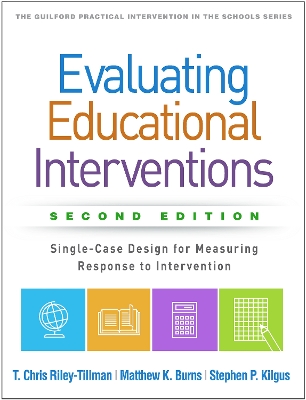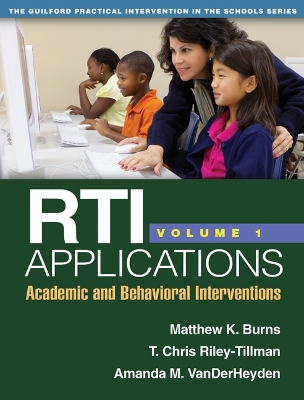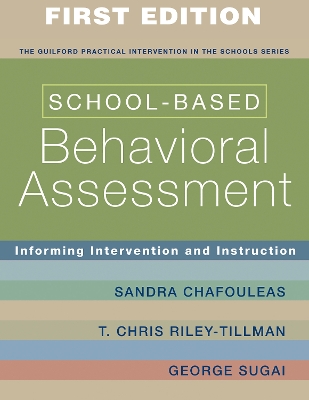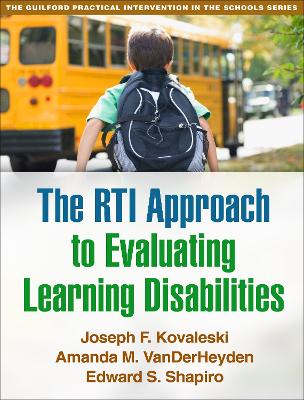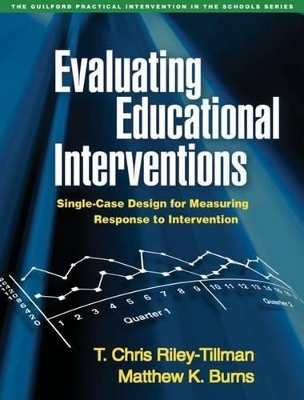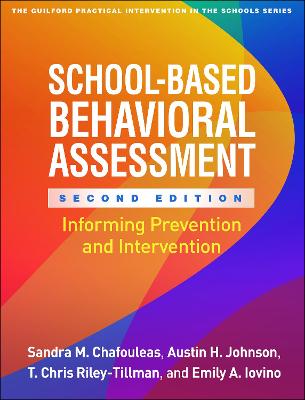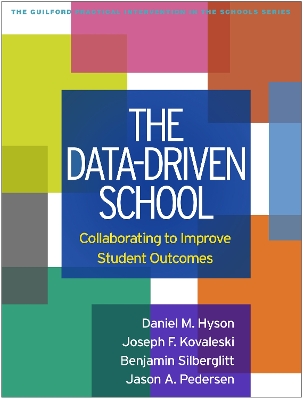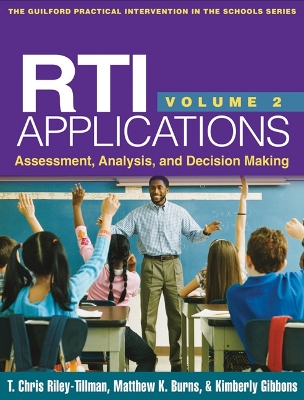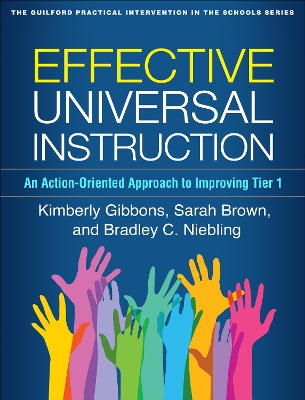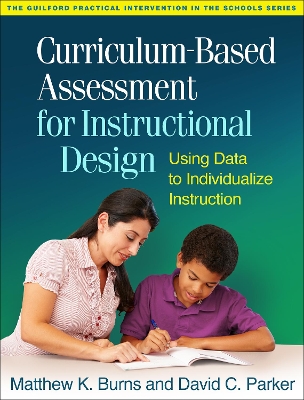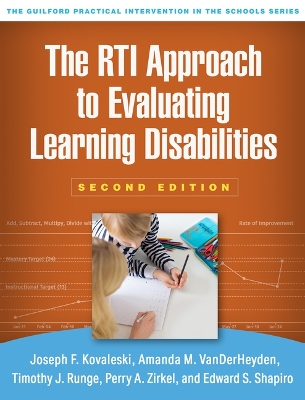Guilford Practical Intervention in the Schools
12 total works
Rti Applications, Volume 1: Academic and Behavioral Interventions
by Amanda M Vanderheyden, T Chris Riley-Tillman, and Matthew K Burns
Evaluating Educational Interventions, Second Edition
by T.Chris Riley-Tillman, Matthew K Burns, and Stephen P. Kilgus
This innovative guide is now in a revised and expanded second edition with an even stronger applied focus. It helps educators harness the potential of single-case design (SCD) as a critical element of data-based decision making in a multi-tiered system of support (MTSS). The authors present simple and complex SCDs and demonstrate their use to defensibly document the effects of academic or behavioral interventions. In a convenient large-size format, the book includes reproducible graphs and other tools; appendices provide guides to analyzing and presenting data in Microsoft Excel. Purchasers get access to a Web page where they can download and print the reproducible materials.
New to This Edition
*Updated to align perfectly with MTSS and current evidence-based practices.
*Chapter on using SCD in educational research.
*Greater emphasis on day-to-day educational practice throughout.
*Significantly revised discussions of brief experimental analysis, complex SCDs, and advanced empirical analyses.
RTI Applications, Volume 1
by Matthew K Burns, T.Chris Riley-Tillman, and Amanda M Vanderheyden
This book addresses a crucial aspect of sustaining a response-to-intervention (RTI) framework in a school: selecting interventions with the greatest likelihood of success and implementing them with integrity. Leading RTI experts explain how to match interventions to students' proficiency levels, drawing on cutting-edge research about the stages of learning. Effective academic and behavioral interventions for all three tiers of RTI are described in step-by-step detail and illustrated with vivid case examples. In a convenient large-size format, the book features more than 40 reproducible planning tools and other helpful forms. Purchasers also get access to a Web page where they can download and print the reproducible materials.
This book is in The Guilford Practical Intervention in the Schools Series, edited by Sandra M. Chafouleas.
See also RTI Applications, Volume 2: Assessment, Analysis, and Decision Making, which provides tools for assessing the effectiveness of RTI practices.
School-Based Behavioral Assessment
by Sandra M Chafouleas, T.Chris Riley-Tillman, and George Sugai
The RTI Approach to Evaluating Learning Disabilities, Lay-flat
by Joseph F. Kovaleski, Amanda M Vanderheyden, and Edward S. Shapiro
This book has been replaced by The RTI Approach to Evaluating Learning Disabilities, Second Edition, ISBN 978-1-4625-5044-9.
Evaluating Educational Interventions
by Matthew K Burns and T Chris Riley-Tillman
School-Based Behavioral Assessment
by Sandra M Chafouleas, Austin H Johnson, T Chris Riley-Tillman, and Emily A Iovino
Revised and expanded with the latest tools and strategies, this concise book offers guidance for effectively conducting social, emotional, and behavioral assessments in today's K-12 schools. The expert authors present foundational knowledge on assessment and data-based decision making at all levels--whole schools, small groups, or individual students--within a multi-tiered system of support (MTSS). Chapters describe when, why, and how to use extant data, systematic direct observation, direct behavior rating, and rating scales. In a large-size format for easy photocopying, the book includes reproducible forms and templates. Purchasers get access to a Web page where they can download and print the reproducible materials.
New to This Edition
*Reflects a decade of change in behavioral assessment, including an increased focus on screening and progress monitoring.
*Includes current knowledge about the defensibility, usability, repeatability, and flexibility of each method.
*Focuses on social, emotional, and behavioral assessment within MTSS frameworks.
*Chapter on practical applications, featuring in-depth case studies.
*Reproducible tools now available online.
This book is in The Guilford Practical Intervention in the Schools Series, edited by Sandra M. Chafouleas.
The Data-Driven School
by Daniel M. Hyson, Joseph F. Kovaleski, Benjamin Silberglitt, and Jason A. Pedersen
This indispensable practitioner's guide helps to build the capacity of school psychologists, administrators, and teachers to use data in collaborative decision making. It presents an applied, step-by-step approach for creating and running effective data teams within a problem-solving framework. The authors describe innovative ways to improve academic and behavioral outcomes at the individual, class, grade, school, and district levels. Applications of readily available technology tools are highlighted. In a large-size format for easy photocopying, the book includes learning activities and helpful reproducible forms. The companion website provides downloadable copies of the reproducible forms as well as Excel spreadsheets, PowerPoint slides, and an online-only chapter on characteristics of effective teams.
This book is in The Guilford Practical Intervention in the Schools Series, edited by Sandra M. Chafouleas.
RTI Applications, Volume 2
by T.Chris Riley-Tillman, Matthew K Burns, and Kimberly Gibbons
Once a response-to-intervention (RTI) framework is in place, how can educators determine whether or not interventions are working? This volume focuses on the "response" component of RTI, providing crucial knowledge and hands-on techniques for assessing the effectiveness of RTI practices in grades K-12. The authors show how to select suitable assessment measures, analyze data about academic and behavioral interventions, and make defensible decisions about groups, individual students, and special education eligibility. Professional development strategies are also addressed. Useful reproducible tools are included; the large-size format facilitates photocopying. Purchasers also get access to a Web page where they can download and print the reproducible materials.
This book is in the Guilford Practical Interventions in the Schools Series, edited by Sandra M. Chafouleas.
See also RTI Applications, Volume 1: Academic and Behavioral Interventions, which covers how to select appropriate interventions and implement them with integrity.
Effective Universal Instruction
by Kimberly Gibbons, Sarah Brown, and Bradley C. Niebling
This accessible volume helps school leadership teams accomplish the crucial yet often overlooked task of improving universal instruction--Tier 1 within a multi-tiered system of support (MTSS). Strong universal instruction reduces the numbers of PreK-12 students who may need additional services and supports. Providing clear action steps and encouraging guidance, the expert authors present a roadmap for evaluating the effectiveness of Tier 1, identifying barriers to successful implementation, and making and sustaining instructional improvements. In a large-size format for easy photocopying, the book includes 27 reproducible checklists, worksheets, and forms. Purchasers get access to a Web page where they can download and print the reproducible materials.
This book is in The Guilford Practical Intervention in the Schools Series, edited by Sandra M. Chafouleas.
Curriculum-Based Assessment for Instructional Design
by Matthew K Burns and David C. Parker
Accessibly written and featuring illustrative case examples, this book provides a complete guide to curriculum-based assessment for instructional design (CBA-ID). CBA-ID comprises easy-to-implement, reliable, and valid procedures for determining a student's instructional level and individualizing instruction by developing tasks that are neither too hard nor too easy. It is a key tool for supporting K-8 students who are struggling in reading, math, or writing, and is ideally suited for intervention planning within multi-tiered systems of support. In a convenient large-size format, the book includes reproducible forms. Purchasers also get access to a Web page where they can download and print the reproducible materials.
This book is in The Guilford Practical Intervention in the Schools Series, edited by Sandra M. Chafouleas.

